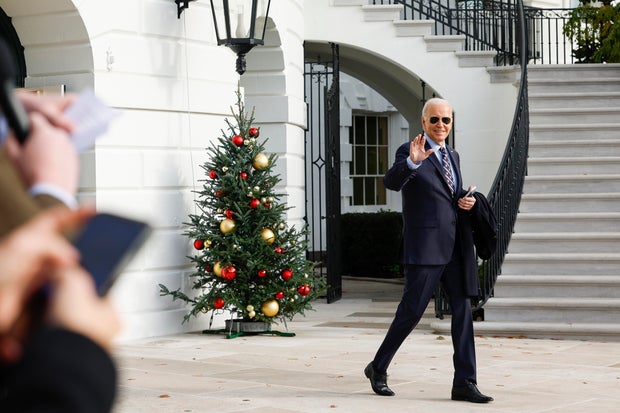The White House’s push to create a strategy to counter Islamophobia is facing reluctance amid a spike in hate-fueled incidents against Arab and Muslim Americans since Hamas’ Oct. 7 attack on Israel.
CBS News spoke with several Muslim and Arab American advocates who voiced frustration with the Biden administration’s response to the situation in Gaza, citing the increasing number of civilians that have been killed and President Biden stopping short of calling for a cease-fire.
Muslim American advocate Salam Al-Marayati has worked with the Biden White House in the past. But despite the Biden administration’s efforts to craft a strategy to counter Islamophobia in the U.S., he’s skeptical about working with them in the future.
“At this moment in time, it is very hard to even imagine how a national strategy to counter Islamophobia will work, Al-Marayati, the president of the Muslim Public Affairs Council, which is also a member of the American Muslim Community Coalition, told CBS News. “American Muslims here in the United States feel unsafe and unsupported as they witness the horrific attacks on Palestinians in Gaza. Muslim families, students, and employees are afraid to speak out for fear of retribution as many who have spoken out have faced retaliatory action including loss of employment, suspension, censorship, trolling, bullying, and targeted violence.”

The White House announced on Nov. 1 plans to develop a national strategy to counter Islamophobia, led by the Domestic Policy and National Security Councils. The proposal follows an announcement in May marking the federal government’s first-ever National Strategy to Counter Antisemitism. Conversations and meetings on the development of the Islamophobia strategy date back a year, according to a senior administration official who said engagement with stakeholders in the community is ongoing with additional meetings scheduled for early next year. The effort is part of a White House interagency policy committee created in Dec. 2022 that focuses on countering antisemitism, Islamophobia and related types of discrimination.
“[The development of the strategy] should be really welcome news. I think the challenge is given what’s going on and especially with the death toll and destruction rising and rising, people are understandably very hurt, angry, shocked [and] frustrated at America’s involvement in this,” said another source close to the discussions surrounding the development of the strategy. “And so the timing of these two different things overlapping even though they are totally separate is really challenging. And unfortunately, I don’t know what will happen with the islamophobia strategy as a result.”
While some have expressed doubts, others say it is important to continue work on ways to counter hate and solve systemic discrimination problems that have targeted the Arab and Muslim communities for decades.
“We recognize, as do most other communities, that engaging on one issue doesn’t mean that you are endorsing or accepting the White House’s policies on that issue or any other issue,” said Arsalan Suleman, who is board chair and co-founder of America Indivisible, a nonprofit dedicated to combating Islamophobia. “So while I and many other community members have very strong criticisms of the current policy on Gaza, we certainly want to engage with the White House on the Islamophobia strategy, given its importance,” Suleman added.
Advocates say a plan to counter Islamophobia in the U.S. is necessary after a spike in anti-Muslim sentiment following Hamas’ Oct. 7 attack in Israel. But some question how effective the strategy could be and hesitate to take part in its development. A White House official told CBS News that administration officials are “listening” to the community and that the Biden administration remains committed to the development of a strategy.
“We’ve had engagements where community members have engaged on the strategy and have also been able to make their points clear about their positions on what’s happening overseas in the course of those engagements while they’ve been focused primarily on the strategy,” a senior administration official said. CBS News spoke to the staffer on background to talk candidly about the ongoing development of the strategy. “We want to make sure that we are listening [and] so as a part of their communication with us, when they raise those issues, of course, we’re listening to them. And many have made the point that what’s happening overseas has an impact on what’s happening in the United States in terms of Islamophobia,” the official said.
The official insisted that support within the Arab and Muslim American community is strong, citing a letter from the American Muslim Community Coalition applauding the early November announcement.
“We commit to participating actively in the process of supporting the development of the strategy, and look forward to a comprehensive approach that addresses the various drivers of Islamophobia, including deep-rooted institutional manifestations that have plagued our communities for decades,” the letter reads.
The White House hopes to complete its work on the strategy in late winter or spring.
The senior administration official also responded to criticism about the timing of the announcement explaining that the White House had planned to announce the development of the strategy well before the Hamas attack in October. Months of conversations and meetings with dozens of Muslim and Arab American groups pre-dated the attack, the official said. An increase in hate-fueled anti-Muslim incidents in the United States — including the deadly stabbing of a 6-year-old Palestinian American boy in the Chicago area — created a need to move forward with announcing the strategy, the official added.







